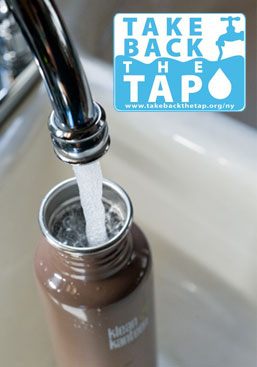 That's right. Fiji water*, one of the most overpriced single-use plastic water bottle companies is in trouble with the Fijian government. MSNBC, AlterNet, and others are reporting that there is a dispute on taxes between the corporation and the military junta government.
That's right. Fiji water*, one of the most overpriced single-use plastic water bottle companies is in trouble with the Fijian government. MSNBC, AlterNet, and others are reporting that there is a dispute on taxes between the corporation and the military junta government.AlterNet reports:
It seems there is trouble in paradise. The boutique bottled water brand Fiji Water has announced that it is shutting down its operations in Fiji after the nation's government proposed a tax hike -- from 1/3 of a cent to 15 cents a liter. This comes just a week after one of the company's top executives, David Roth, was deported.Ouch. On the one hand, how great is it that there is less bottled water coming from one of the worst collusions in corporate-governmental history. But how terrible is it that the junta will sell it to some other corporation to come in and exploit the people and the ecosystem in which they live to sell overpriced water primarily to people who don't need it but are stuck believing in a manufactured need for "convenient" and "glamorous" "Artesian water?" Companies like Coke, Pepsi, Nestle, Violia, Suez, and Thames are probably going to scramble all over each other to get at this one.
I'm with Maude Barlowe and Wenonah Hauter of Food and Water Watch who say the closure should be permanent. At Food and Water Watch today they write the following:
“Like oil in the 20th century, water has become increasingly managed by corporate cartels that move it around the globe, where it flows out of communities and towards money. The commodification of water will continue to contribute to human rights abuses around the world, whether it helps bolster undemocratic governments or drives water from a community where it is needed.
“Water must be managed as a common resource, not as a market commodity. Unfortunately, celebrities, sports figures and American consumers pay a premium for the Fiji Water brand, buying it at approximately 3,300 times the cost of U.S. tap water. According to the EPA, a gallon of tap water costs consumers anywhere from .002 to .003 cents. A liter of Fiji Water costs approximately $2.19.
“Ironically, Fiji Water, Coca-Cola and PepsiCo have been named finalists for the Secretary of State’s 2010 Award for Corporate Excellence. It would be extremely unwise for Secretary of State Hillary Clinton to honor these corporations, which have been known to extract water from developing countries that are facing water scarcity or that otherwise cannot meet residents’ needs for clean water and sanitation.”
Hear here! Are you going to walk away from bottled water? Do it. And tell Take Back the Tap that you are on board by signing the pledge.
Hat tip to Vince and Jess for this one.
* You have to love the sound of the tropical rain forest coming through your computer to show you just how free and unblemished that water is. If only corporations really protected the wild that much. Maybe they'd leave the water there for the wildlife and the people. Just a thought.